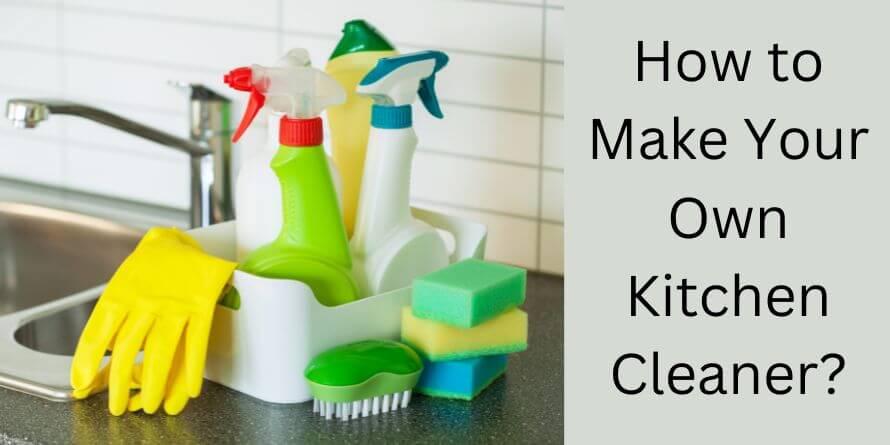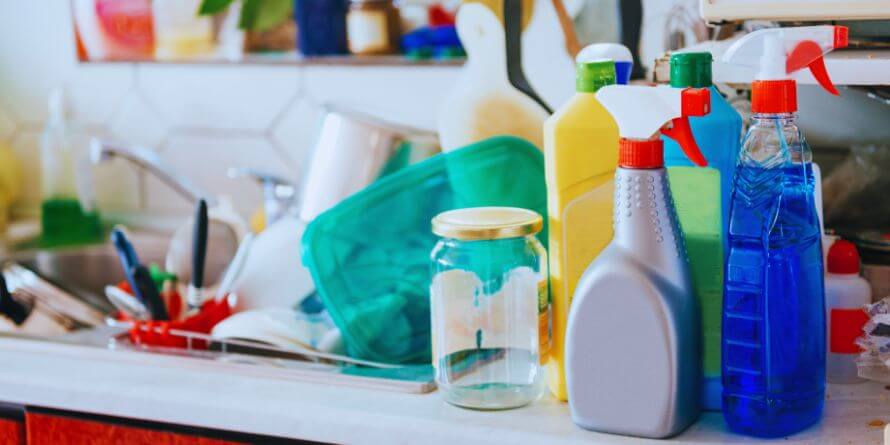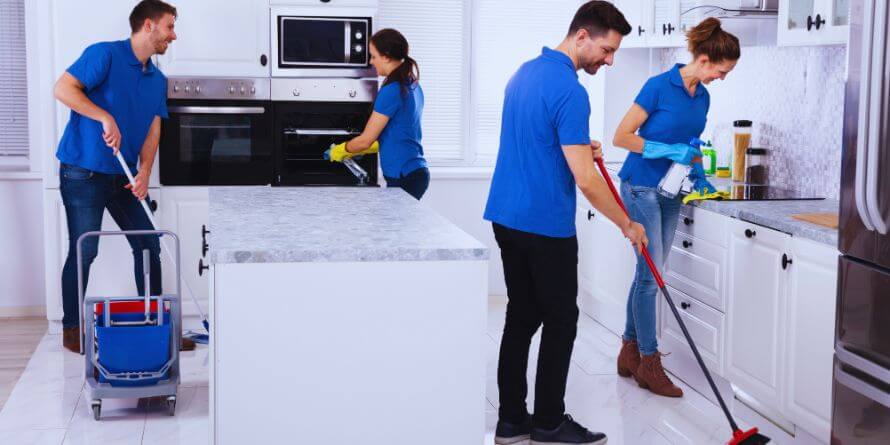Making your kitchen cleaner is a cost-effective way to get natural and non-toxic cleaning products. You buy bulk ingredients, which makes the process highly economical and long-lasting. But Today I will narrate to you how to make your own kitchen cleaner.
DIY cleaners are hygienic and allergen-free because they do not contain chemicals. The process creates less waste and chemical pollution. Besides this, you can also customize the cleaners according to the areas you want to clean.
Ingredient ratio and product quality- everything is in your hands. You can make the cleaner as effective and potent as you want.
How to Make Your Own Kitchen Cleaner?
Several kitchen cleaners can be prepared with simple home ingredients. These cleaners are popular for their versatility, as a single solution can be used to clean countertops, stoves, cabinets, and kitchen floors.

1. General Homemade Kitchen Cleaners
A general kitchen cleaner that can play multiple roles can be prepared by mixing 1 cup of water with ¼ cup of hydrogen peroxide and an equal quantity of citric acid. An old spray can is best for mixing them all and storing them for a long period.
- Prepare a gentle combination of hydrogen peroxide and spray liquid.
- Essential oil is optional, and you can skip it if you desire.
- Shake the whole liquid well before spraying it on the surface.
Natural Kitchen Cleaner Recipe
The main ingredients of natural cleaners are three parts of rubbing alcohol and one part of water. You can also add a few drops of lemon juice because it has disinfectant properties that clean greasy stains without damaging surfaces.
Essential oils are optional, but their use gives a refreshing scent. Lelvendor and orange oil can prove more beneficial in this context.
How to Make Homemade Kitchen Cleaners?
To make the kitchen cleaner, three parts water and one part vinegar or bi-carb soda can be mixed. Some people are irritated by the vinegar smell, which can be eradicated by adding lemon, peppermint, or lavender oil drops.
These kitchen cleaners prepared at home are cost-effective and give the same results without any additional chemical effects.
2. How to Make Your Own Kitchen Cleaner with Vinegar?
Vinegar-based kitchen cleaners can be made by mixing equal parts of regular tap water and vinegar. Boiled or filtered water can give more efficient results, but boiled water should be cooled down before adding vinegar. You can also add a few drops of grapefruit oil.
If you want to create homemade kitchen cleaners without vinegar, castile soap is the best alternative. It can be scented or non-scented. These DIY cleaners become good germ-fighters and stain-removing mixtures.

3. Specialized Homemade Kitchen Cleaners
Some specialized DIY cleaners include essential oil cleaners composed of tea tree, lemon, and lavender oils, which provide a pleasant fragrance and are highly effective against bacteria and fungi.
Similarly, dawn-containing cleaners are highly effective for grease-cutting abilities, while granite helps clean granite titles because they require a specific pH; otherwise, they dissolve with the cleaner. Let’s explore how to make them at home:
Cleaner with Essential Oils
Equal amounts of water, witch hazel, and rosemary or peppermint oils should be mixed well and shaken. This formula can be used to remove tough debris from the target area.
Cleaner with Dawn
Take a one-third cup of distilled water and add an equal proportion of Dawn’s dish soap. You can add one or two tablespoons of isopropyl alcohol, but it is not necessary because you can easily replace it with vodka, depending on availability.
Now, mix them together so that all the ingredients have a fine consistency.
Cleaner for Granite
To make an effective granite cleaner, you can mix water and rubbing oil, but remember that the quantity of water will be higher or double that of rubbing oil. Regular dish soap is a key ingredient in this cleaner but use it moderately.
4. All-Purpose Homemade Cleaners
These cleaners work equally well on every kind of surface and every part of the home, including the kitchen, bathroom, and bedrooms, and are known for their effectiveness in the following:

Cleaner Spray
Cleaner spray is a liquid that you sprinkle on the targeted dirty area. It is beneficial in two ways: first, you don’t have to prepare a solution before using it, and second, the pre-added water content wipes out the stuck pile-up.
To prepare it, a small amount of castile soap is mixed into distilled water. Any fragrance oil is optional, but if added, it can enhance the spray’s value.
Cleaning Solution
The difference between a cleaning spray and solution is that spray can be sprinkled on the area, while solution comes in a bit of consistency and is used in small amounts mixed with water.
You can use borax and vinegar or any other product that provides citric acid properties. If you do not have borax, you can use the commonly available baking soda for the same results.
Fragrance substances and oils are not mandatory, so you can use them only if you prefer them.
5. Surface-Specific Homemade Cleaners
Surface-specific solutions are those that are used for certain surfaces, and their use on irrelevant surfaces can cause damage. Home floors are made from several surfaces, such as wood, stainless steel, granite, glass, and mirrors.
A composite mixture of water, essential oils, and baking soda remains the same, but a few ingredients can be changed according to surface type.
For kitchen floor
The best-smelling homemade floor cleaner depends on the specific floor type, which can be tile, vinyl, or linoleum. However, mixing water, baking soda, and white vinegar effectively cleans basic floors.
For kitchen sinks
Sinks come in a variety of materials, so you can’t prepare a one-size-fits-all formula for them, but a general cleaner with a mild detergent formula includes vinegar plus lemon juice or lemon juice with baking soda.
Remember that if the sink material is porcelain, vinegar can’t be used because it will destroy the material and tarnish its appearance.
For kitchen cabinets
A homemade kitchen countertop cleaner can be prepared by mixing olive oil and vinegar with lukewarm water. Simply spraying this cleaner on cabinets and wiping it out after leaving it for a few seconds helps to remove the greasy stains.
FAQs
What is the best homemade kitchen surface cleaner?
A solution of vinegar and water is safe and result-oriented for most kitchen surfaces.
What is the best homemade cleaning solution?
Every solution that is effective but mild enough that it doesn’t destroy the respective surface and its material is the best cleaning solution. But always try to use natural ingredients.
What is the recipe for homemade kitchen counter cleaner?
Mix castile soap and distilled water; the results will amaze you.
The Bottom Line
These homemade 30-second cleaner recipes are the best alternative to synthetic and store-bought kitchen cleaners, which contain chemicals and many impurities, leading to environmental pollution and poor kitchen hygiene.
Do your research, carefully understand the ingredients, and then prepare solutions combining effective ingredients in calculated amounts for the best results.
They will make your kitchen shine and charming without breaking the bank. So, this guide will help you in your cookroom about how to make your own kitchen cleaner.

